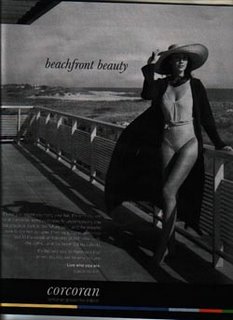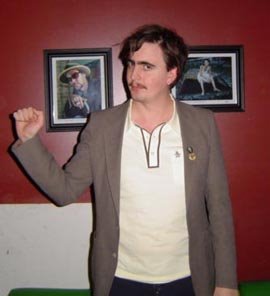Way, Way, Way Downstairs (and don't even know it!)
So, last Sunday, after a long and boring drive home from Portland, I sat down with a cup of coffee to read my Sunday New York Times. After getting the real sections out of the way, I turned to the fluffier Magazine and came across an amusing little article by Walter Kirn ("The Way We Live Now: Way Upstairs, Downstairs," April 16). It's a meditation on growing class inequality in the US.
"There are studies that prove it," writes Kirn,
Fair enough, though as a professional writer and editor who, as it happens, is also currently unemployed, both professionally and personally I would have liked a bit more discussion of those "studies" he has no need of reading. But what struck me as most amusing cannot really be recorded here as well as need be: seriously, read page 11 of the physical copy and you see what I mean. Kirn writes, somewhat abridged by me, the following:
Now, what makes this particular comment so ironic and amusing is that it appears on page 11 of the magazine. Page 12, adjacent, contains the following advertisement for the Corcoran Real Estate Group:

Since the above image is no doubt too small to be read, allow me to quote the text in the bottom left: "It's not just where you hang your hat. It's who you are. So at Corcoran, we're dedicated to understanding you. The practical, ook-to-the-future you... and the dreamy, look-to-the-horizon you. Then we focus on hhomes that fit the needs and desires of both—the beds, the baths... and the breathtaking sunsets."
And who do you need to be to have the Corcoran Group care about you so? Well, a house of the week on their website recently was featured in a New York Post profile. Price? $2.3 million.
Of course, it's no surprise that The New York Times is, in many ways, an elitist institution. For all their liberal slant, their fairly good coverage of the broadening economic gap in America (Walter Kirn's rambling aside), they are also an incredibly expensive newspaper. A dollar for the daily edition and $5 for the Sunday on the newsstand; even my student rate is $20 a month, against which the cost of either The Seattle Times or The Seattle Post-Intelligencer pales.
And I'm not the only one to have noted this recently. Back in their April 17 edition, The New Republic published a cover story by Michelle Cottle entitled "The Gray Lady Wears Prada." In it, Cottle writes of the "Styles" sections on Thursday and Sunday, which, "if one were feeling ungenerous, could be characterized as a smarter, higher-end variation on Lucky."
"The Times is hardly breaking new ground with its foray into what may be best described as luxury porn," she writes.
Ah, Ms. Cottle...it's all fine and dandy to deride the embrace of elitism by a liberal publication, but she's not one to talk. An simple examination of The New Republic's media kit reveals that TNR, long a bastion for cutting edge thought amongst the American left, is, itself, somewhat of an elitist institution. The average household income of a New Republic reader is a whopping $153,000, the average net worth an impressive $1.3 million. Compare that to their leftier competitor The Nation. According to their media kit, the median income of a Nation subscriber is a more reasonable $69,500, mean $90,000. As for net worth, the median in $377,000, the mean $786,000. Still far wealthier than this subscriber (to both), but more reasonable. The New Republic's readers are overall an affluent bunch: 93% own investments averaging $740,000. 65% travelled internationally yearly, 76% attended operas, the symphony or a dance troupe yearly, and 31% bought wine by the case.
Sitting listlessly around my Seattle apartment listening to Blondie, I am actually chuckling as I write this. It's always reassuring to think, by the demos, that I'm a member of such an elite club since I subscribe to TNR, and gives me some hope I will someday join their rarified ranks. Yet the troubling fact remains: most people of normal means aren't reading The New York Times or The New Republic, both influential and important publications. Perhaps it's a sign of our times, with the readily available supply of choir-preaching bloggers that people simply want to hear what they want to hear and need not be challenged by real news or intelligent analysis. Certainly our bitter political partisanship discourages non-partisan consideration of issues. Whatever the case, though, it's terribly disappointing to think that the only people exposed so serious consideration of increasing economic inequality are the ones coming out on top of the great class differentiation process taking place.
"There are studies that prove it," writes Kirn,
but I don't need to read them. I've seen the prices on the menus. I've also seen the pay stubs of the cooks. I've stood in the mansions, let in by the maids, and listened to the string quartets, whose players I've met in the coat aisle at Goodwill. I know what's going on. As predicted, but much faster than anticipated, the rich in America are getting richer (at rates that favor the very rich and the superrich). And at the same time, as wasn't quite predicted but still seems faster than anticipated, the nonrich are getting almost nowhere.
Fair enough, though as a professional writer and editor who, as it happens, is also currently unemployed, both professionally and personally I would have liked a bit more discussion of those "studies" he has no need of reading. But what struck me as most amusing cannot really be recorded here as well as need be: seriously, read page 11 of the physical copy and you see what I mean. Kirn writes, somewhat abridged by me, the following:
It doesn't help that the vocabulary of wealth and poverty hasn't been adjusted for inflation since the heyday of dimwitted 1960's TV comedy. We still call the very rich among us millionaires, even though lots of them are closer to billionaires. Words fail reality at the other end too. In 1974, I knew exactly what the grown-ups meant when they called a person "poor" ... It's a simple idea without a simple word now.
Meanwhile, the nonsimple words are taking over. The words with 11 bedrooms and 7 baths that are larger and finer than rich folks needed before the "differentiation" — which isn't merely an economic trend but a style, an aesthetic.
Now, what makes this particular comment so ironic and amusing is that it appears on page 11 of the magazine. Page 12, adjacent, contains the following advertisement for the Corcoran Real Estate Group:

Since the above image is no doubt too small to be read, allow me to quote the text in the bottom left: "It's not just where you hang your hat. It's who you are. So at Corcoran, we're dedicated to understanding you. The practical, ook-to-the-future you... and the dreamy, look-to-the-horizon you. Then we focus on hhomes that fit the needs and desires of both—the beds, the baths... and the breathtaking sunsets."
And who do you need to be to have the Corcoran Group care about you so? Well, a house of the week on their website recently was featured in a New York Post profile. Price? $2.3 million.
Of course, it's no surprise that The New York Times is, in many ways, an elitist institution. For all their liberal slant, their fairly good coverage of the broadening economic gap in America (Walter Kirn's rambling aside), they are also an incredibly expensive newspaper. A dollar for the daily edition and $5 for the Sunday on the newsstand; even my student rate is $20 a month, against which the cost of either The Seattle Times or The Seattle Post-Intelligencer pales.
And I'm not the only one to have noted this recently. Back in their April 17 edition, The New Republic published a cover story by Michelle Cottle entitled "The Gray Lady Wears Prada." In it, Cottle writes of the "Styles" sections on Thursday and Sunday, which, "if one were feeling ungenerous, could be characterized as a smarter, higher-end variation on Lucky."
"The Times is hardly breaking new ground with its foray into what may be best described as luxury porn," she writes.
Most metro areas with the proper concentration of wealth boast at least one slick glossy peddling the luxe life. And, hot on the heels of "Thursday Styles," last September The Wall Street Journal introduced its own shopping-on-steroids section, suggestively titled "Pursuits." But it's one thing for a bunch of glorified ad vehicles—or even the rampantly capitalist Wall Street Journal—to be hawking designer duffel bags and skin cream priced higher than Jack Abramoff's legal team. After all, these publications unabashedly promote—and generally cater to readers who share—a Trump-esque mine-is-bigger-than-yours attitude toward wealth and consumption. It's quite another matter, however, for the venerable Times to lend its imprimatur to a genre so awkwardly at odds with its own high-minded liberal sensibility and intellectual pretensions. This, after all, is the same paper that, last year, ran an eleven-part series on class in America, in which it described economic mobility as 'the promise that lies at the heart of the American dream' and exhaustively pondered its apparent decline.
Ah, Ms. Cottle...it's all fine and dandy to deride the embrace of elitism by a liberal publication, but she's not one to talk. An simple examination of The New Republic's media kit reveals that TNR, long a bastion for cutting edge thought amongst the American left, is, itself, somewhat of an elitist institution. The average household income of a New Republic reader is a whopping $153,000, the average net worth an impressive $1.3 million. Compare that to their leftier competitor The Nation. According to their media kit, the median income of a Nation subscriber is a more reasonable $69,500, mean $90,000. As for net worth, the median in $377,000, the mean $786,000. Still far wealthier than this subscriber (to both), but more reasonable. The New Republic's readers are overall an affluent bunch: 93% own investments averaging $740,000. 65% travelled internationally yearly, 76% attended operas, the symphony or a dance troupe yearly, and 31% bought wine by the case.
Sitting listlessly around my Seattle apartment listening to Blondie, I am actually chuckling as I write this. It's always reassuring to think, by the demos, that I'm a member of such an elite club since I subscribe to TNR, and gives me some hope I will someday join their rarified ranks. Yet the troubling fact remains: most people of normal means aren't reading The New York Times or The New Republic, both influential and important publications. Perhaps it's a sign of our times, with the readily available supply of choir-preaching bloggers that people simply want to hear what they want to hear and need not be challenged by real news or intelligent analysis. Certainly our bitter political partisanship discourages non-partisan consideration of issues. Whatever the case, though, it's terribly disappointing to think that the only people exposed so serious consideration of increasing economic inequality are the ones coming out on top of the great class differentiation process taking place.



